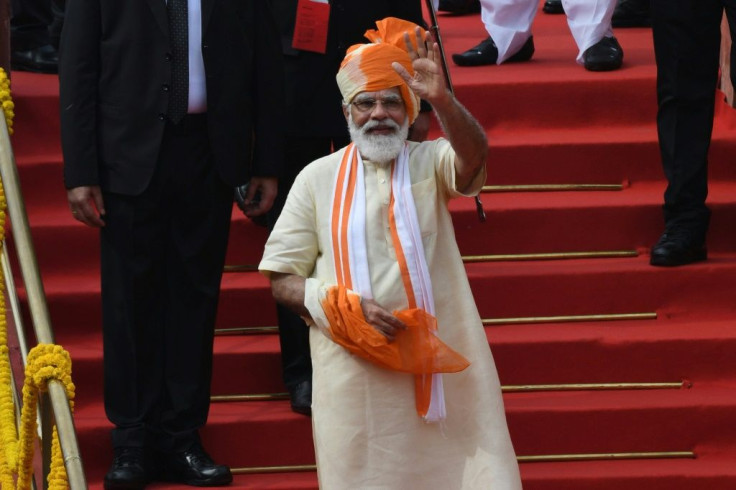India’s Prohibition Of Chinese Apps Could Open Opportunities For US Tech Firms In Subcontinent

KEY POINTS
- On Wednesday, New Delhi banned 118 Chinese apps, citing data security concerns
- India had already banned 59 other Chinese apps in June, including TikTok
- Beijing has already heavily invested in India's tech sector
The Indian government’s decision to ban more than 100 Chinese-made apps may increase opportunities for U.S. tech firms seeking to deepen their footprints in the subcontinent.
On Wednesday, New Delhi banned 118 Chinese apps, including those owned by such prominent companies as Tencent Holding, NetEase Inc., Baidu Inc. and Ant Group.
India’s Ministry of Electronics and Information Technology cited that these apps were “engaged in activities which is prejudicial to [India’s] sovereignty and integrity” and also claimed they transmitted data on Indian citizens to servers outside the country.
These “apps collect and share data in a surreptitious manner and compromise personal data and information of users that can have a severe threat to the security of the state,” the ministry added.
Echoing some of the fears voiced by U.S. officials over Beijing using its tech prowess for information gathering and espionage, India had already banned 59 other Chinese apps in June, including TikTok and WeChat.
India has also threatened to block Chinese telecoms equipment companies Huawei and ZTE from its next-generation 5G mobile networks.
Geopolitical tensions between the Asian giants have spiked recently over some deadly border clashes and that has disrupted their economic ties.
“Chinese firms are learning a painful lesson. And, that is, the foreign policy of China has hijacked their business,” Abishur Prakash, a geopolitical specialist at the Center for Innovating the Future in Toronto told CNBC. “China’s geopolitics with India has led to a nationwide fallout for Chinese firms.”
Rodger Baker, senior vice president of strategic analysis at Stratfor, a geopolitical intelligence platform, told CNBC: “We have seen the Indians taking even a more aggressive stance on banning Chinese apps, Chinese technology, than the United States has proffered in its battle with the Chinese.”
Baker added: “Part of that is the Indians trying to stir their own domestic technology, really incentivize the development of their technology sector and try to position themselves also as a place for other countries to be able to invest in technology development.”
However, eliminating Chinese influence in India’s tech ecosystem will not be easy since Beijing has already heavily invested in the country – at least $4 billion has been poured into Indian tech startups in recent years, for example. Many Indian unicorns — startups valued at more than $1 billion — have been funded by the Chinese.
Now given India’s aggressive stance against China, such investments may fade.
“Chinese technology firms know that the days of expanding freely across the world are over,” Prakash said. “[China] may start building products and services exclusively for certain markets, instead of for the world. This will intensify geopolitical competition between U.S. and China, as Chinese firms build a bigger footprint in certain regions.”
The U.S. – which wants more investment in one of the world’s largest markets – would like to step in to fill the void in India.
“The banning of Chinese apps leaves a big gap to fill for the [tech] industry,” said Neil Shah, research director at Counterpoint Research. “It offers more opportunities for established players from [the] U.S. and elsewhere to expand market share. For example, [India’s] banning on TikTok is benefiting Instagram Reels [which is owned Facebook (FB)]”
Both Facebook and Alphabet (GOOG) unit Google have invested more than $10 billion in the aggregate into Indian digital services firm Jio Platforms, which is owned by India’s wealthiest man Mukesh Ambani.
Prakash pointed out that India and U.S. have similar interests and strategies.
“[Indian] Prime Minister [Narendra] Modi’s biggest rule is self-reliance,” he said. “From defense to e-commerce, he doesn’t want India reliant on anything foreign. And, while India has built its own domestic software industry, it lags in hardware, like chips. At the same time, U.S. firms are looking for a new base to build hardware and a new consumer base to take their products to. It’s a win-win.”
For example, Apple (AAPL) is eager to open its first retail store in India and sell more smartphones in a market dominated by Xiaomi of China and Samsung of South Korea.
“India has more than half a billion smartphone users and [the] second largest smartphone market in the world, and with consumers buying their third or fourth smartphone in [the] coming years, they tend to buy a better phone which opens up opportunities for Apple in [a] premium segment,” Shah said.
“Further with anti-China sentiment, it could eventually work in Apple’s favor. Google and Facebook, unlike Apple don’t have access to [the] world’s largest smartphone market, China. So India is the only large, huge scale smartphone market for these companies."
Referring to Google and Facebook’s investment in Jio, Shah noted that “partnering with India’s largest, most ambitious and influential telco, gives them a great partner to cement their position and scale in the Indian market.”
But some analysts warn that banning so many apps may deter other countries from seeking business ties in India.
“The app bans not only give a negative signal to Chinese firms and investors already in India, but even those waiting for a favorable climate to invest in India may now back off now,” said Atul Pandey, a partner at law firm Khaitan & Co.
© Copyright IBTimes 2025. All rights reserved.





















